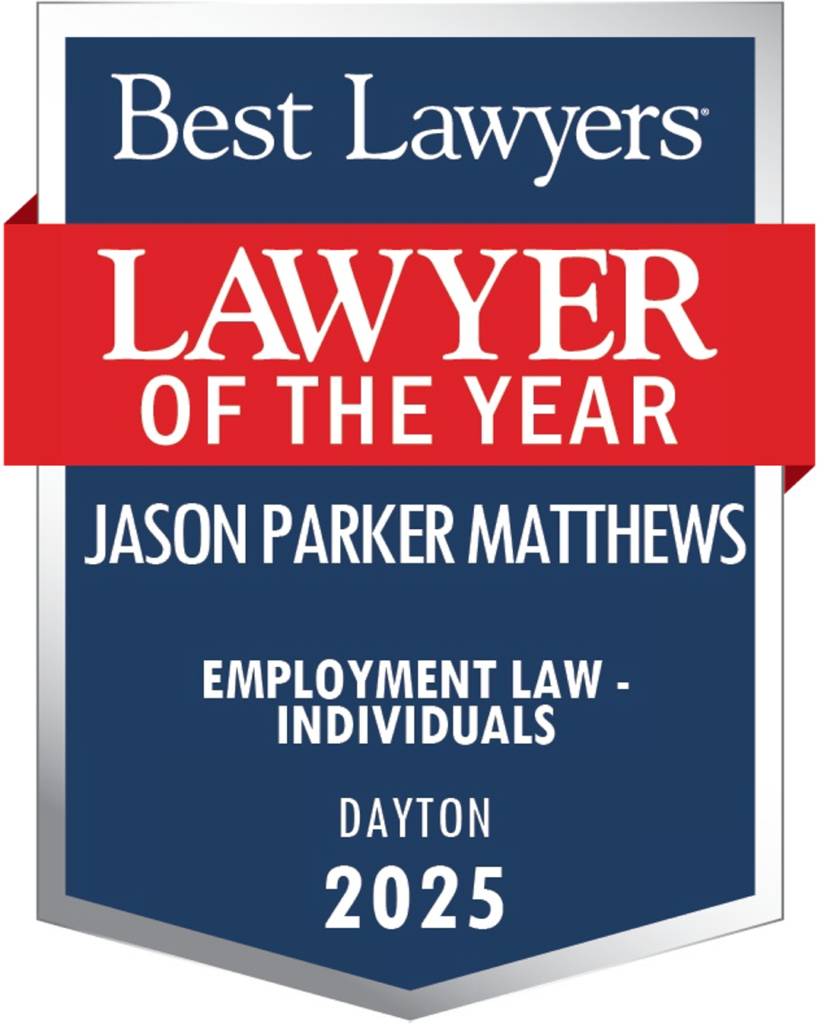Dayton Employment Lawyers
Providing practical legal advice and aggressive representation to employees for over 20-years.
- Sexual Harassment
- Disability, Age, Race, Sex, & Pregnancy Discrimination
- Wrongful Termination
- Severance Agreements
- Employment Contracts
- Physician & Executive Agreements
- Unemployment Hearings
- FMLA (Family and Medical Leave Act)
- Pre-Disciplinary Hearings
- State Personnel Board of Review
- Merit Systems Protection Board
- Non-Compete Agreement

The best results start with securing the best legal representation.
Our Advantage
Compassion:
Our office understands that our clients employment related legal matters can cause stress, adversely impact their physical and mental health and have broad reaching financial consequences. We attempt to work with our clients to provide individualized, practical and cost effective solutions to meet their needs
Experience:
Jason P. Matthews is a former Ohio Civil Rights Commission (OCRC) investigator who transitioned to private practice in 2004. Since that time he has established a strong record of aggressively litigating employment cases before Ohio’s state and federal courts, as well as administrative agencies such as OCRC, EEOC, UCRC, SPBR and MSPB.
Reputation:
Jason P. Matthews has been recognized by Best Lawyers as the employee side Employment Law Lawyer of the Year for 2025 in Dayton, Ohio. He has been ranked by Ohio Super Lawyers, Lawyers of Distinction, Three Best Rated and Expertise.com as one of the top employment lawyers in Dayton. Jason is a past co-chairperson of the Dayton Bar Association’s Labor and Employment Law Section.
Our Practice Areas
Fighting for the Rights of Employees for Over 20 Years
![]()
Sexual harassment is a form of sex discrimination under Ohio and federal law. Sexual harassment can involve quid pro quo harassment in which an employee’s supervisor or manager requests sexual favors in exchange for employment benefits such as a promotion or favorable job assignment or the conduct of a manager or co-worker can create a hostile work environment. A hostile work environment exists when an employee is subjected to unwanted statements, comments, jokes or attention of a sexual nature and the perpetrator’s conduct is severe or pervasive. Sexual harassment may involve persons of the same sex or opposite sex.
Ohio’s prohibition against sexual harassment in the workplace is found in Ohio Revised Code Section 4112. Federal laws against sexual harassment fall under Title VII of the Civil Rights Act of 1964.
Jason P. Matthews is experienced in working with victims of sexual harassment and assisting them in obtaining results which address both the economic and psychological impact of the harasser’s conduct.
Schedule a consultation to discuss your potential Sexual Harassment case.
![]()
State and federal laws prohibit employers from discriminating against employees, including harassing employees, on the basis of disability, age, race, sex, pregnancy, religion, national origin, ancestry and military status. Employment discrimination cases are inherently difficult to prove because the burden of proof is on the employee and employers have the resources to hire teams of attorneys who can disguise the employers’ true intent. If you believe that you have been discriminated against in the workplace, you should consult an experienced discrimination law attorney with a track record of success in employment discrimination cases.
Jason P. Matthews has extensive experience counseling and successfully representing employees who have been discriminated against on the basis of disability, age, race, sex, pregnancy, religious, national origin, ancestry and military status discrimination. Prior to entering private practice, Jason served as a Civil Rights Representative for the Ohio Civil Rights Commission, where he investigated hundreds of employment discrimination cases and worked closely with lawyers from the Ohio Attorney General’s office who sought justice for victims of discrimination. Since 2004, Jason has recovered millions of dollars for victims of employment discrimination through pre-litigation settlements, administrative proceedings before the Ohio Civil Rights Commission and Equal Employment Opportunity Commission and lawsuits filed in Ohio’s state and federal courts.
Schedule a consultation to discuss your potential employment discrimination case.
![]()
“Wrongful termination” is a legal term of art which means that an employee has been discharged from employment in violation of a state or federal law, an employment contract or in contravention of a clearly established public policy embodied in statutory or common law or legal regulations.
Examples of wrongful terminations include, but are not limited to, discharges due to age, sex, pregnancy, race, religion, national origin, ancestry, disability, for complaining of unlawful discrimination, for taking leave under the Family and Medical Leave Act, for filing workers compensation claims, and for reporting OSHA violations.
Jason P. Matthews frequently represents employees in lawsuits and pre-suit negotiations involving statutory and public policy wrongful discharge claims. Jason has served as a presenter at National Business Institute and Dayton Bar Association seminars on the topic of public policy wrongful termination.
Schedule a consultation to discuss your potential Wrongful Termination case.
![]()
Employers may offer severance agreements or separation agreements to employees at the time of a termination, layoff or position elimination. These agreements are carefully drafted by attorneys who are retained to protect the interests of employers. While severance and separation agreements can offer financial benefits to employees, there are strings attached to these benefits. The agreements routinely require that employees waive their rights to pursue legal action, agree to confidentiality, non-disparagement and no-hire clauses and can even include covenants not to compete/non-compete agreements. By signing a severance or separation agreement, you may be signing away your rights to pursue viable legal claims along with other rights.
Jason P. Matthews has been reviewing severance and separation agreements for over 20-years. He is often able to identify potential legal claims and assist employees in successfully negotiating additional monetary and non-monetary benefits.
Schedule a consultation to discuss your severance agreement or separation agreement.
![]()
Jason P. Matthews represents clients in a variety of matters pertaining to employee contracts. Common issues involve reviewing and negotiating employment contracts, including physician and executive contracts, advising clients on non-competition agreements, reviewing and negotiating severance agreements and litigating breach of contract and estoppel claims.
Employment contracts may be expressed in the form of a document laying out terms and conditions of employment signed by both parties or may be implied through representations communicated in a less formal manner which are relied upon by the employee.
Schedule a consultation to discuss your potential Employment Contract case.
![]()
Employers frequently offer written employment contracts and compensation agreements to physicians, physician assistants, advanced practice nurses and business executives. These agreements are carefully drafted by attorneys who are retained to protect the interests of employers and written in a manner which can be unclear and confusing to even intelligent, well-educated and highly successful professionals. Employees can benefit from having their employment contracts reviewed by an experienced attorney looking out for their interests.
Jason P. Matthews has been reviewing employment contracts for over 20-years. He is able to identify potential problems and propose revisions to contracts which will protect the interests of his clients.
Schedule a consultation to discuss your employment contract.
![]()
If an employee in the State of Ohio is terminated without just cause and meets general eligibility requirements then the employee is typically entitled to receive unemployment compensation benefits. The purpose of these benefits are to create a safety net for employees terminated due to reasons outside of their control. Issues that are commonly considered when reviewing unemployment compensation cases consist of the evidence supporting the employer’s reason for termination, whether the basis for the termination is discussed in an employment policy, the applicability of a progressive disciplinary policy and the extent to which the employee was given the opportunity to bring his or her performance or conduct in line with the employer’s policies and communicated expectations. If an employee is denied compensation, he or she must timely appeal the claim.
Ohio Revised Code Section 4141 contains the laws pertaining to unemployment compensation in the State of Ohio.
Jason P. Matthews has been representing employees in hearings before the Unemployment Compensation Review Commission since 2004. He draws on that experience to assist clients in understanding the process and aggressively representing their interests.
Schedule a consultation to discuss your potential Unemployment Compensation case.
![]()
The Family and Medical Leave Act of 1993 (FMLA) provides eligible employees with up to twelve-weeks of unpaid leave from work to care for themselves or a family member with a serious medical condition and requires that employers allow employees to return to their positions. Leave may be utilized in a block or on an intermittent basis. It is illegal for employers to interfere with employees’ rights to take leave and to return to their jobs. Additionally, the FMLA prohibits retaliation against employees for taking FMLA leave.
Jason P. Matthews frequently represents employees in lawsuits and settlement negotiations arising from violations of the FMLA. Common issues include miscalculation of leave periods by the employer, employees not receiving credit for FMLA leave against productivity goals and retaliation against employees after they utilize FMLA leave.
Schedule a consultation to discuss your potential FMLA case.
![]()
Most public sector employees in Ohio, including employees of the federal government, are entitled to pre-disciplinary hearings prior to serious disciplinary action being taken against them. These hearings are required as a protection of the employee’s due process rights under the Fourteenth Amendment to the United States Constitution.
Jason P. Matthews has been representing public sector employees at pre-disciplinary hearings for over 20-years. Jason has successfully defended employees against unwarranted disciplinary actions, thereby preserving their careers, pensions and professional reputations.
Schedule a consultation to discuss your pre-disciplinary hearing.
![]()
Classified employees of Ohio’s state agencies and its 88 counties have appeal rights from certain personnel actions, including suspensions and terminations, to the Ohio State Personnel Board of Review.
Jason P. Matthews has been representing employees at State Personnel Board of Review hearings for over 20-years. Jason has successfully defended employees against unwarranted disciplinary actions, thereby preserving their careers, pensions and professional reputations.
Schedule a consultation to discuss your State Personnel Board of Review case.
![]()
Jason P. Matthews has substantial experience representing federal employees in matters before the Merit Systems Protection Board (MSPB). He provides knowledgeable and dedicated advocacy for clients facing issues such as wrongful termination, disciplinary actions, and other employment disputes under the MSPB’s jurisdiction.
Jason’s career began with the Ohio Civil Rights Commission, where he investigated discrimination and employment-related complaints, laying the foundation for his expertise in employment law. He further honed his skills during his nine years with Jeffrey M. Silverstein and Associates before establishing his own practice.
A member of the Dayton Bar Association’s Labor and Employment Law Committee and the Ohio Employment Lawyers Association since 2006, Jason is committed to protecting employees’ rights. His deep understanding of federal employment laws and processes ensures that his clients receive comprehensive and effective representation before the MSPB.
![]()
Non-compete agreements can impede an employee’s ability to work for a competitor or to solicit an employer’s customers, vendors or employees. Ohio courts routinely enforce non-compete agreements if they are considered to be reasonable in scope. Employers retain skilled attorneys to draft these agreements to broadly protect their interests. Employees should review their non-compete agreements with an attorney prior to signing the agreements and/or before accepting employment with a potential competitor.
Jason P. Matthews has been advising employees on non-compete agreements for over 20-years. During this time he has also successfully defended employees accused of breaching their non-compete agreements
Schedule a consultation to discuss your non-compete agreement.
Reviews
Dayton Employment Lawyers















